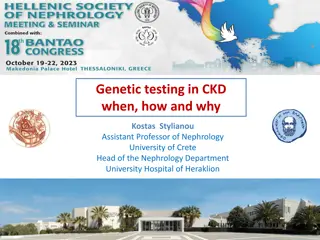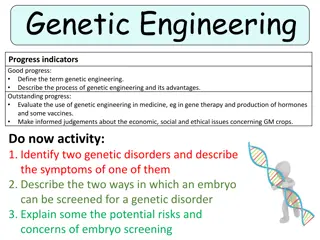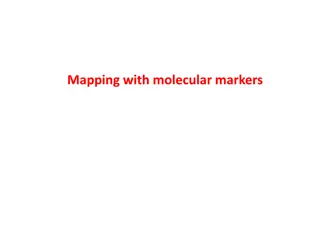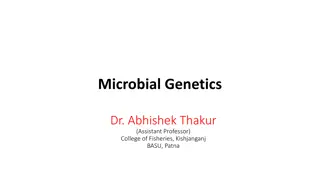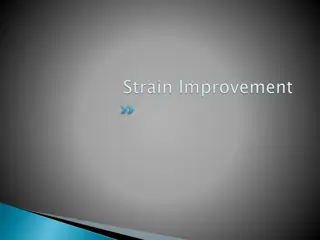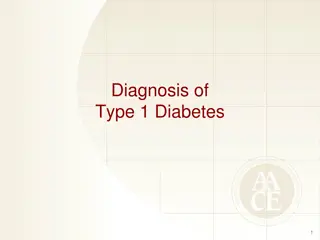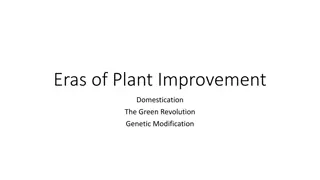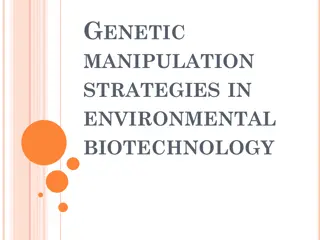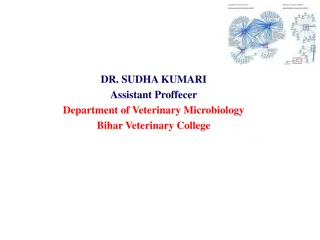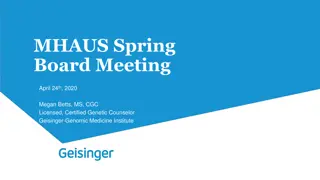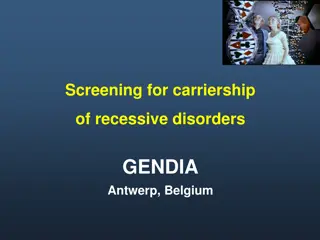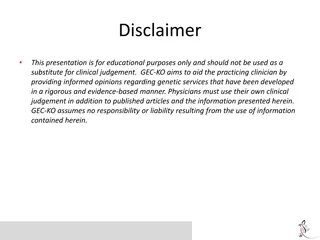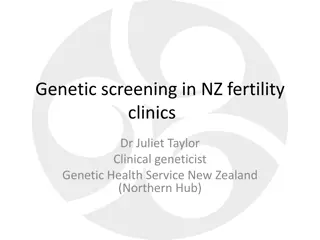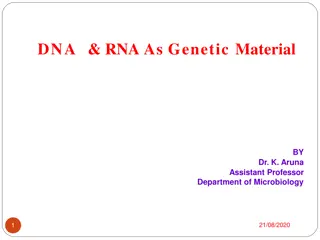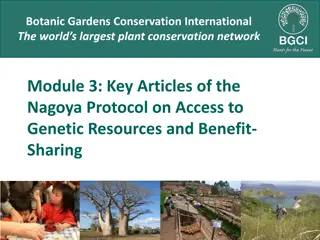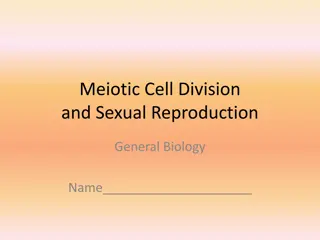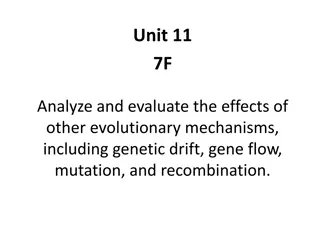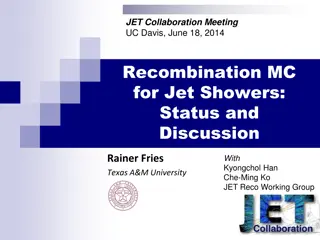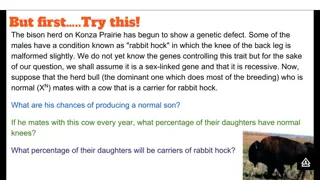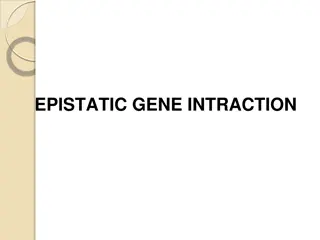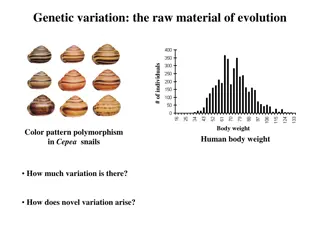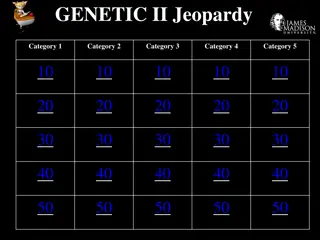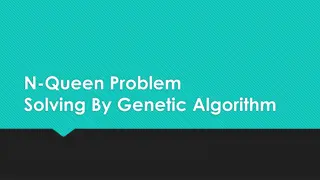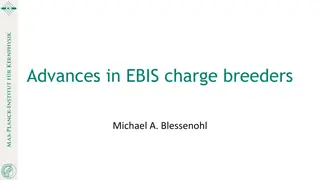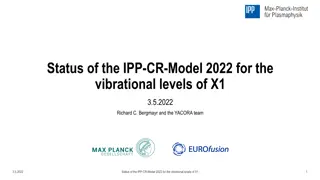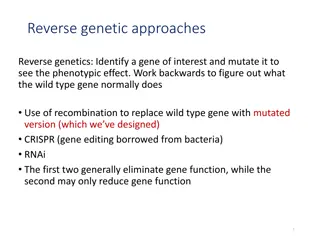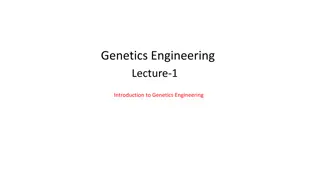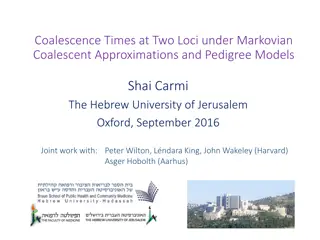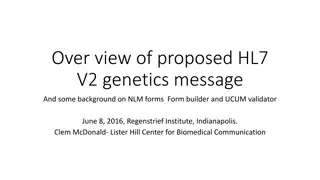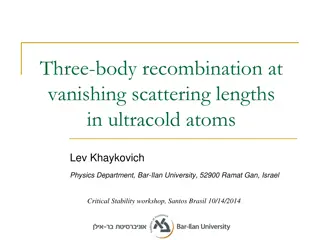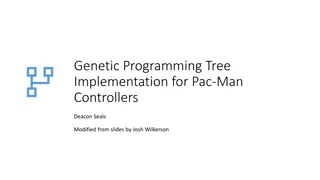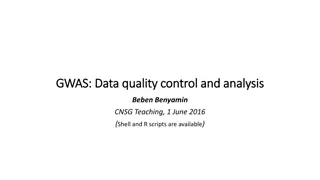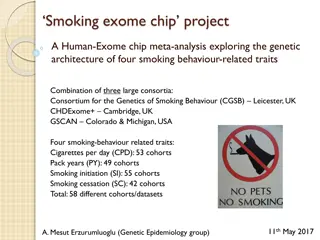Genetic Testing in Chronic Kidney Disease (CKD): Insights and Applications
Genetic testing plays a crucial role in identifying inherited kidney diseases, with around 15% of CKD cases having monogenic causes. Despite a high percentage of patients reporting a family history of CKD, Mendelian causes only account for about 10% of adult ESRD cases. Understanding the genetic bas
1 views • 52 slides
Overview of Human Genetic Disorders
Human genetic disorders encompass a range of conditions, from recessive disorders like cystic fibrosis to dominant disorders such as Huntington's disease. Examples include cystic fibrosis, Huntington's disease, and sickle-cell anemia. Understanding genetic disorders involves research and awareness o
0 views • 10 slides
Exploring Genetic Engineering: From Basics to Applications
Genetic engineering involves altering the genetic material of organisms to achieve desirable traits. This process entails cutting out specific genes from one organism and transferring them to another. In medicine, genetic engineering finds applications in gene therapy, hormone production, and vaccin
0 views • 12 slides
Understanding Genetic Markers in Molecular Mapping
Genetic markers play a crucial role in gene mapping within molecular biotechnology. They are fragments of DNA associated with specific genomic locations, aiding in identifying DNA sequences and analyzing genetic variation. Various types of genetic markers such as RFLP, SSR, and SNP offer insights in
1 views • 26 slides
Understanding Genetics: Mutations, Chromosomal Aberrations, and Genetic Engineering
Genetic mutations can be harmless, harmful, or beneficial, leading to variations within a species. Examples of gene mutations and chromosomal aberrations, like Trisomy 21, illustrate genetic abnormalities. The increase in Down Syndrome cases with maternal age highlights a maternal age effect. Geneti
0 views • 17 slides
Understanding Microbial Genetics and Mutations in Organisms
Explore the world of microbial genetics with Dr. Abhishek Thakur, an Assistant Professor specializing in Microbial Genetics at the College of Fisheries, Kishjanganj, BASU, Patna. Learn about important concepts such as strains, clones, genome, phenotype, genotype, genes, genetic recombination, and mu
0 views • 19 slides
Exploring Genetic Engineering: A Journey into Manipulating Organisms
Delve into the world of genetic engineering, where organisms' genetic makeup is altered for various purposes. Discover the process of modification, the history of genetic manipulation, and the impact of genetically modified organisms on society and science.
0 views • 20 slides
Improving Microbial Productivity and Characteristics for Industrial Applications
Efforts to enhance the productivity of natural isolates for commercial products involve genetic modifications through mutation, genetic recombination, and genetic engineering techniques. Desired characteristics include genetic stability, efficient production, versatility in carbon sources, and ease
1 views • 25 slides
Classification and Genetic Defects of Diabetes
The diagnosis and differential diagnosis of Type 1 and Type 2 diabetes are discussed, detailing the clinical courses, age of onset, body weight characteristics, onset patterns, and genetic factors. The etiologic classification of diabetes including insulin-deficient, immune-mediated, monogenic, and
0 views • 16 slides
Evolution of Plant Improvement: Domestication to Genetic Modification
Plant improvement has evolved through different eras - from ancient domestication to the Green Revolution and genetic modification. Domestication shaped major crops over millennia, the Green Revolution introduced high-yielding varieties, and genetic modification allows direct genetic alterations for
0 views • 6 slides
Genetic Manipulation in Environmental Biotechnology
Genetic manipulation strategies in environmental biotechnology involve techniques like gene splicing and molecular cloning to modify genes directly. These methods have various applications such as isolating genes, producing specific molecules, improving biochemical production, creating organisms wit
0 views • 20 slides
Understanding Bacterial Transformation in Molecular Biology
Transformation in molecular biology is a process where genetic material is altered by the uptake of exogenous DNA. It involves the direct incorporation of genetic material into a cell, leading to genetic changes. This phenomenon was first demonstrated by Frederick Griffith in 1928. The process of tr
1 views • 25 slides
Understanding Genetic Counselors and the NSGC
Genetic counselors play vital roles in healthcare by assisting patients with genetic conditions, advocating for their needs, educating providers, conducting research, and influencing public policy. The National Society of Genetic Counselors (NSGC) supports genetic counselors in their professional en
3 views • 12 slides
Genetic Carrier Screening for Recessive Disorders by GENDIA, Antwerp, Belgium
Explore the world of genetic carrier screening offered by GENDIA in Antwerp, Belgium. Learn about prenatal screening for various genetic disorders, including Down syndrome and severe monogenic disorders. Discover the frequency of common recessive disorders and the severity of genetic diseases. Uncov
0 views • 17 slides
Exploring Expanded Carrier Screening in Family Planning
Learn about expanded carrier screening as a tool for identifying genetic risks in family planning scenarios. Understand the importance of genetic testing, considerations for non-consanguineous couples like Julie and Chris, and the evolving landscape of genetic services. Explore key aspects such as f
1 views • 36 slides
Genetic Screening and Reproductive Carrier Testing in New Zealand Fertility Clinics
Genetic screening and reproductive carrier testing play crucial roles in identifying and managing genetic disorders in couples planning for pregnancy. While carrier screening is recommended for all couples, it is not widely followed in New Zealand. Pre-conceptual reproductive carrier screening is no
0 views • 19 slides
Understanding Direct-to-Consumer Genetic Testing: Cases and Considerations
Explore real-life scenarios of individuals opting for Direct-to-Consumer Genetic Testing (DTC-GT) to assess genetic risk for various health conditions. Consider the implications, limitations, and cautions associated with DTC-GT, highlighting the importance of comprehensive evaluation and genetic cou
0 views • 39 slides
Understanding Genetic Disorders and Their Impact on Health
Genetic disorders are caused by abnormalities in genes or chromosomes, leading to various health conditions. Inherited disorders can be passed down from parents to children, affecting physical makeup and processes in the body. In India, there is a high prevalence of genetic disorders, particularly i
1 views • 12 slides
Understanding DNA and RNA as Genetic Material
Genetic material plays a crucial role in the transmission of traits from one generation to the next. This article explores the significance of DNA and RNA as genetic material, highlighting key experiments and discoveries that demonstrate DNA's role in carrying hereditary information. From Mendel's h
0 views • 32 slides
Understanding the Key Articles of the Nagoya Protocol on Access to Genetic Resources and Benefit-Sharing
The Nagoya Protocol aims to promote fair sharing of benefits from genetic resources utilization for conservation efforts. It encompasses access, technology transfer, funding, and respect for rights over resources and technologies. The protocol applies to genetic resources, traditional knowledge, and
1 views • 19 slides
Understanding Meiotic Cell Division and Sexual Reproduction in General Biology
Meiosis is a crucial process in sexually reproducing organisms where cells divide to produce sex cells with half the normal number of chromosomes. This ensures genetic variation in offspring. Meiosis takes place in specific cells of an organism with paired chromosomes (diploid cells), leading to the
0 views • 18 slides
Exploring Evolutionary Mechanisms: Genetic Drift, Gene Flow, Mutation, and Recombination
Delve into the effects of evolutionary mechanisms such as genetic drift, gene flow, mutation, and recombination in populations. Understand how changes in allele frequencies occur due to various factors like natural disasters and the bottleneck effect, impacting the gene pool and future generations.
1 views • 32 slides
Recombination in Jet Showers: Status and Discussion
This document discusses the status and ongoing research on recombination in jet showers, particularly focusing on the JET Collaboration Meeting at UC Davis in June 2014. Topics covered include in-medium hadronization, jet recombination formalism, application to in-medium shower Monte Carlos, challen
1 views • 24 slides
Understanding Linked Genes and Genetic Mapping in Inheritance
Linked genes inherited together on chromosomes influence genetic traits. Discover the differences between sex-linked and linked genes, the concept of crossing over, linkage mapping, and the significance of gene distance in recombination. Explore the work of Alfred Sturtevant in gene mapping through
1 views • 21 slides
Understanding Epistasis: Genetic Interactions and Their Implications
Epistasis is a phenomenon where the phenotypic expression of one gene is influenced by interactions with another gene. This concept, first introduced in 1909, plays a crucial role in genetics, affecting various traits and evolutionary processes. The difference between dominance and epistasis lies in
0 views • 41 slides
Understanding Genetic Variation and Its Role in Evolution
Genetic variation is crucial for evolution, providing the raw material for adaptation and species diversity. Phenotypic variation can arise from differences in genotype, environment, or their interaction. Studying genetic variation through statistical analysis and at the molecular level helps us unr
0 views • 47 slides
Genetics II Jeopardy: Linked Genes, Genetic Mapping, and Sex Chromosomes
Explore the world of genetics with Genetics II Jeopardy, covering topics such as linked genes, genetic mapping, sex chromosomes, and inheritance patterns. Discover the significance of gene location on chromosomes, the concept of recombination frequency, and the role of specific genes like SRY in mal
0 views • 26 slides
Evolutionary Computation and Genetic Algorithms Overview
Explore the world of evolutionary computation and genetic algorithms through a presentation outlining the concepts of genetic algorithms, parallel genetic algorithms, genetic programming, evolution strategies, classifier systems, and evolution programming. Delve into scenarios in the forest where gi
0 views • 51 slides
Solving N-Queen Problem Using Genetic Algorithm
Solving the N-Queen problem involves placing queens on a chessboard in such a way that they cannot check each other. The genetic algorithm approach addresses this problem through representations like phenotype and genotype, fitness evaluation based on queen penalties, mutations involving permutation
0 views • 8 slides
Advancements in Rare Isotope Research at EURISOL Town Meeting
Cutting-edge research and facility developments in the field of rare isotopes were showcased at the EURISOL Town Meeting in INFN - Pisa. Topics included advances in EBIS charge breeders, the ARIEL Extension facility, and the CANREB laboratory with Electron Beam Ion Source technology. Various aspects
0 views • 39 slides
Status of IPP-CR Model 2022 for Vibrational Levels of X1
The IPP-CR Model 2022 for vibrational levels of X1 is discussed in detail, including comparisons with other models like Yacora, Buckman, Celiberto, Bardsley, and more. Various reactions, electron impact processes, dissociation pathways, charge exchanges, ionization mechanisms, recombination processe
0 views • 13 slides
Electronic Structure and Auger Recombination in Silicon Nanocrystals Doped with P, Li, S
This study investigates the electronic structure and Auger recombination rates in silicon nanocrystals doped with phosphorus, lithium, and sulfur. It includes published data on radiative recombination lifetimes, relative rates of recombination, and modeling of nanocrystal structures using computatio
0 views • 13 slides
Understanding Reverse Genetic Approaches in Gene Manipulation
Reverse genetic approaches involve mutating a target gene to observe its phenotypic effects, providing insights into the gene's normal function. Techniques like gene knockout, knockdown, and homologous recombination are used to manipulate genes and study genetic pathways, leading to discoveries in v
0 views • 6 slides
Basics of Genetics Engineering: Introduction to DNA and Gene Expression
Exploring the fundamentals of genetics engineering, this lecture covers topics such as DNA structure, gene expression, gene function, genome, mutation, recombination, and genetic modification. Understand the significance of DNA, genes, and the processes involved in gene expression. Dive into the wor
0 views • 20 slides
Coalescence Times at Two Loci under Markovian Coalescent Models
This presentation discusses coalescence times at two loci using Markovian coalescent approximations and pedigree models. The speaker, Shai Carmi from The Hebrew University of Jerusalem, presents joint work with other researchers, focusing on the ARG, SMC, and the effect of shared pedigree on estimat
0 views • 21 slides
Overview of HL7 V2 Genetics Messaging and LOINC Genetic Testing Codes
This content delves into the proposed HL7 V2 genetics message, NLM forms builder, UCUM validator, and the current state of genetic testing codes in LOINC. It discusses the types of molecular genetic tests present in LOINC and the evolution towards newer genetic tests. The content also covers how LOI
0 views • 21 slides
Three-Body Recombination in Ultracold Atoms: Studies and Observations
Investigating three-body recombination in ultracold atoms, this study explores the Efimov scenario, experimental setups with ultracold 7Li atoms, and the implications of three-body inelastic collisions. The research delves into universality windows, real molecule comparisons, and the loss rate from
0 views • 35 slides
Genetic Programming Tree Implementation for Pac-Man Controllers
Implementation of genetic programming tree for Pac-Man controllers involves methods like random search through parse tree space, full genetic programming recombination, mutation, and competitive co-evolution. The setup includes defining the problem formulation, scoring function represented as a tree
0 views • 26 slides
Understanding GWAS: A Brief Overview of Genetic Association Studies
GWAS, or Genome-Wide Association Studies, are a method used to map genes associated with traits or diseases by analyzing genetic markers throughout the genome. This process involves statistically testing the association between SNPs and traits using regression or chi-squared tests in a hypothesis-fr
0 views • 19 slides
Genetic Architecture of Smoking Behavior Traits: Meta-Analysis Insights
Exploring the genetic basis of smoking behavior-related traits through a meta-analysis combining data from three large consortia across 58 different cohorts/datasets. The study investigates genetic variants associated with cigarettes per day, pack years, smoking initiation, and smoking cessation. Ov
0 views • 34 slides
